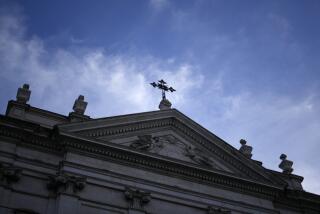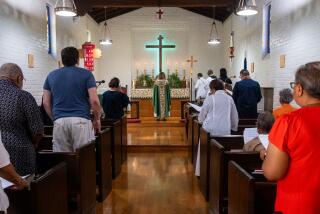The Siren’s Call: Doubt and faith
Missed appointments for the apocalypse, like the one in May, do more than give nonbelievers a chance to crack a joke. They create doubts in some of the faithful; after all, the world didn’t end — but is there really somebody out there?
The same can happen when an ancient practice gets turned on its head, like the Christian belief in the power of relics — something described last month in this column — which makes God seem pretty mean if he expects us to grovel over parts of dead bodies before he’ll give us any help.
These are macro-examples of doubt, but Sarah Sentilles’ “Breaking Up With God: A Love Story” (HarperOne: 244 pp., $22.99) is very much a micro one, a personal chronicle charting the battle between her growing doubts and a desperate wish to hang on to religious faith.
“I believed in a male God,” she writes, early in the book. “I loved him. I needed him. Sometimes he was gentle and kind. Sometimes he frightened me.”
Like many, she started with a child’s Sunday-school version of God — the kindly man watching our lives through a hole in the clouds. “Breaking Up With God” describes her childhood in New Jersey and Texas, her beginnings as a Catholic and her quest to shed that juvenile version of God during years of academic achievement and distinction at Yale and Harvard, and explores her loneliness and self-esteem issues. She also spends time in Southern California as a teacher in Compton in the Teach for America program (see her 2005 book “Taught by America”) and as a member of All Saints Church in Pasadena, where she discovers a loving, welcoming community. They treat her like a little sister or a daughter, showing her love in the smallest of gestures:
“People knew what was going on in my life. They prayed for me, prayed for my students, let me cry, brought me soup when I had the flu, sent me home with hot toddies after night meetings when I had a sore throat… I belonged.… When the priest dismissed the congregation at the end of a church service one Sunday she said, ‘We are home,’ and I knew it was true.”
They’re also the ones who tell her that she has spiritual gifts and should consider entering the Episcopal priesthood. She does.
“Other twenty-three-year-olds I knew didn’t want to be priests, and that was, at least in part, why I chose the vocation,” she says with brutal honesty. “Wanting to be a priest marked me as different, and being different felt like being chosen.”
But it doesn’t work out. Sentilles struggles too much with the judgment in so many people’s attitudes toward faith and God, especially self-proclaimed God-fearing people who use religion to attack other people’s sexuality and lifestyles. As an apprentice pastor she learns that no one wants to hear provocative political talk from the pulpit even though, she says, “faith and politics weren’t separate for me … I went to divinity school … because I thought churches could help make the world more just and life-giving for everyone.” After struggling with an Episcopalian discernment committee helping her make a decision about her vocation, she calls it quits.
To this point this review has tried to be charitable even though there’s a problem: Sentilles’ memoir is a claustrophobic book.
She restlessly moves from one idea to another — scattered throughout are meager summations of the efforts of major theologians (Martin Buber and Paul Tillich among them) to understand the divine reality. She never seems to stop long enough to live with a particular view of God. Let’s adopt her cliché of a breakup with God for a moment: It takes a long time and many shared experiences to build a deep understanding of one’s beloved. Often it has little to do with words — but there’s too much talk here, too much chatter about competing viewpoints.
The monastic approach to faith appeals to this reviewer because humility is a crucial ingredient — a daily process of letting go of larger ambitions, of focusing on the now, of quietly listening. It’s nothing unique to Christianity either — you find it in other traditions and other memoirs, whether it’s Ram Dass struggling with his ego in an ashram or Siddhartha Gautama confronting death and disease with the Middle Way. A knowledge of other traditions might have opened a window for Sentilles onto what the divine reality is all about.
One final problem has to do with being a twentysomething — who really knows anything in their 20s? — and wrestling with the archangel of doubt in a lethal intellectual atmosphere: graduate school (in her case, Harvard Divinity School). Anybody who’s done time in grad school knows what I’m talking about: It’s all rarefied there, heavily cerebral, frequently subversive — not the best place to go when you are on shaky ground about your beliefs and self-identity.
Yet Sentilles endures it all, and she emerges at memoir’s end with her own intellectual position. The problem is, it was hard to be interested in it. She has a grating way of talking about her discoveries about faith — she acts as if she’s the first to make them. I was relieved to finish the book, but not before hoping she might find her way back to that community at All Saints and settle for proof of God’s existence in a simple bowl of soup.
*****
Thankfully, I had another book at hand that brims with all the patience and wisdom that Sentilles’ lacks:
“I was at the lowest point in my life. I had lost all I thought I needed. I did not know how to go on.
It was an enormous, sudden peace.
I knew, very quietly, that I would not find God in this place. I knew it was possible I would not find God at all. And so I could not explain the overwhelming peace I felt. I could not explain how I knew, absolutely, that it would be all right.”
That is Marya Hornbacher, recalling a visit to a convent in the introduction to “Waiting: A Nonbeliever’s Higher Power” (Hazelden: 168 pp., $14.95 paper). She doesn’t chatter endlessly about competing models of God. She sits and listens.
“Waiting” is not a book about God but about the process addicts must take from bottoming out to realizing their ability for spiritual renewal even if they don’t believe. “Faith does not imply a God,” she says, “the faith we need is a faith that spiritual growth and wholeness are possible for us.”
As the author of two harrowing memoirs, “Madness” and “Wasted,” Hornbacher knows whereof she speaks. She has endured the dark night of the soul in her own life, and her experiences seem trustworthy. You feel confident in following her where her book leads you. “Waiting” is sympathetic, generous and offers a wide horizon to all kinds of truth-seekers.
Owchar is deputy book editor of the Times. The Siren’s Call appears monthly at https://www.latimes.com/books.
More to Read
Sign up for our Book Club newsletter
Get the latest news, events and more from the Los Angeles Times Book Club, and help us get L.A. reading and talking.
You may occasionally receive promotional content from the Los Angeles Times.






